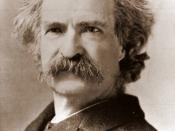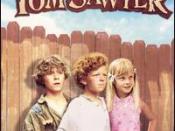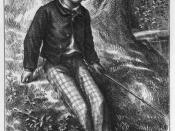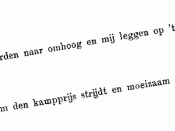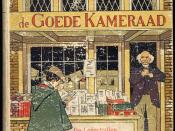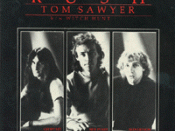I still remember when I was 11 years old; I saw the movie Blank Check. In the movie, Preston makes a million dollars by filling in a million dollars on a blank check and then cashing it at the bank. After watching the movie, I told my mom that I wanted to make a million dollars by winner it under the cap of a Coke bottle. She replied "Stop dreaming about getting a million dollars but try earning it."ÃÂ In the same respect, my mom's attitude toward me dreaming of a million dollars is similar to Mark Twain's attitude of romanticism "ÃÂ If it can't happen, let's not think about it. Mark Twain suggests throughout Adventures of Huckleberry Finn that life is not a romantic adventure, however a difficult and painstaking journey, and dreaming of ideal scenarios is foolish and purposeless but despite this, Twain still utilizes a few romantic elements in the novel.
Twain possesses an utter dislike of romanticism and therefore chooses to be satirical of it through many examples in the book. The blatant message that "romanticism is stupid"ÃÂ will be depicted.
Beginning with Walter Scott, Twain satirizes romanticism by sinking the Walter Scott. One would not understand the satirizing if the background of Walter Scott was not known. Walter Scott was amongst the most famous romantic authors at the time, which then has Twain name a ship after him. However despite the "honor"ÃÂ of naming a ship after the England renowned author, Twain sinks the ship suggesting that Walter Scott should cease to exist or drown. In this day, it would be like John Grisham naming a character Stephen King in a book and then having him shot. Furthermore, Twain satirizes romanticism with the Grangerford residence. The Grangerfords serve as a wealthy family. The wealth is to the extent that everyone in the family has a slave to themselves. "Each person had their own nigger to wait on them."ÃÂ (107) Throughout many romantic novels, the wealthy family will serve as a family that is usually logical, rationale and sivilized for the most part. However, the Grangerfords are not in the least logical in their pursuit of the family feud with the Shepherdsons. In fact, they don't even know why it began and yet are still are determined to "win."ÃÂ "ÃÂ "What was the trouble, Buck? "ÃÂ Land? I reckon maybe- I don't know. Well, who done the shooting? -was it a Grangerford or a Shepherdson? Laws, how do I know? It was so long ago."ÃÂ Next, Twain expresses his dislike of romanticism through Jim's "realistic"ÃÂ hardships. In a romantic novel, Jim would most likely get away without any hardships at all to complement the definition that is "ÃÂ fictitious or unrealistic. (Webster '98) This element is further illustrated by the examples where Jim seems to be juggled around by many different owners because the owners are either oblivious of how to get Jim back (Miss Watson) or they would just like to make a buck. (Dauphin) Nonetheless, Jim is literally made into an object of possession therefore "dehumanizing"ÃÂ Jim due to the simple element that he is black which serves as a very realistic scenario back in the day of Mark Twain. The satire in the example is that in the day and age where heavy popularity is found in romanticism, Twain makes the bold step of expressing Jim's enslavement in a very realistic perspective. However, any novice writer could simply change the events to have Jim be in "easier"ÃÂ predicaments to get out of therefore achieving the societal norm and popularity of romanticism. Twain strives for the image of "being different"ÃÂ and in doing so, does everything in his power to be contrary to what was expected in his time that is "ÃÂ to be romantic. To further convey Twain's pursuit to satirize romanticism, Twain brings in the character Tom Sawyer as the "epitome"ÃÂ of romanticism. Tom Sawyer is a respectable boy according to Huck. Tom Sawyer has a name in the society and is rather high class. However, at the same time, Tom Sawyer loves to do things that are fictitious and rather unrealistic. Look to the beginning portion of the book where Tom Sawyer creates a gang that wants to ransom. Tom Sawyer doesn't have the slightest idea of what a ransom is however insists passionately upon using it because Tom Sawyer states "I've seen it in books; and so of course that's what we've got to do."ÃÂ(9) Twain continues with Tom Sawyer as the epitome of romanticism by having Huck first devises a plan to simply steal a key and free Jim. Tom Sawyer, despite his concurrence that the plan would work, tells Huck that the plan is too "simple"ÃÂ and devises a plan that involves being ostentatious and adventure, which could very easily get them, killed. Therefore, with the establishment of an "epitome"ÃÂ of romanticism, Twain does two things with Tom Sawyer, which are extremely clever to satirize romanticism. (Clever in the sense that they are not overt) First, whenever Huck tries to act like Tom Sawyer, negative repercussions occur to express that trying to act romantic only has a negative side. (i.e. when Huck pretends to be like a girl and gets caught which endangers Jim as well) However, whenever Huck acts like his practical self, good consequences come such as when Huck tells Mary Jane that the family will be united, Mary Jane tells him that she'll always remember him and her prayers. This event would probably have Huck feel pretty "good"ÃÂ inside because of the fact that he received those comments from a girl who has "a lot of grit."ÃÂ Twain further utilizes Tom Sawyer (the epitome of romanticism) in his pursuit to satirize romanticism by having Tom Sawyer getting shot. The humor is found in the fact that the epitome of romanticism was shot (hurt). To further add to the satirizing of romanticism, Tom Sawyer was happy when he was shot. "ÃÂ "Tom was the gladdest of all, because he had a bullet in the calf of his leg."ÃÂ Again, this fact is extremely fictitious and unrealistic because when was the last time a boy was happy when he got a bullet in his leg.
As if, getting shot was not enough, Twain further satirizes romanticism by having Tom Sawyer wear the bullet that was taken from his leg around his neck to serve as an accolade and a reminder of such an adventurous day.
Twain's "quest"ÃÂ to satirize romanticism and to be different is further depicted in his satirizing of education as well. Twain, in a sense, possessed the gift of prophecy foreseeing that in the future, most children would find school "loathsome."ÃÂ (Or be "vexed"ÃÂ from school) The "romantic"ÃÂ thing to do would be to write a book having every child wanting to go to school because after all, education is a "good"ÃÂ thing. Twain however, has Huck not only find being sivilized unattractive, but also has Huck dislike school, the latter being a very pragmatic idea especially in this generation and but perhaps not quite as apparent in Twain's.
Although, Twain's satirizing of romanticism is prevalent throughout the novel, Twain nonetheless utilizes some romantic elements. In chapters nine and ten, Twain romanticizes the island by having the island serve as nearly a utopia. The island is peaceful, plentiful in food, and most importantly, is safe, a rather fictitious and unrealistic milieu due to the fact that the two are escaping from the east that is "ÃÂ societal conformity. Twain's purpose of having a "utopian"ÃÂ island is not well portrayed, albeit it nonetheless did not have the intention to disprove Twain's idea of satirizing romanticism.
After looking to Twain's depiction of romanticism that is "ÃÂ a complete waste of time and more or less stupid, one can see that Twain's satirizing was thorough through the many examples throughout the novel. Therefore, when asked the question of "What is Twain's attitude toward romanticism"ÃÂ, one can concur with Twain by replying "It is utterly stupid to contemplate the fictitious and unrealistic."ÃÂ To hope for ideal scenarios to occur in our painstaking and difficult lives is simply as rare as winning a million dollars through a lucky coke cap.
